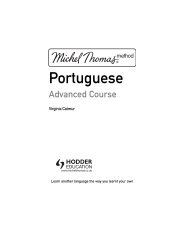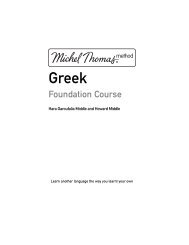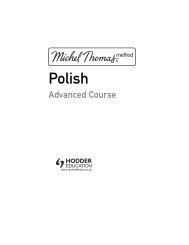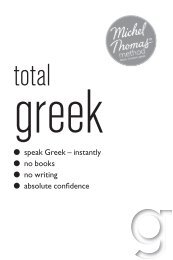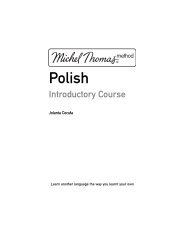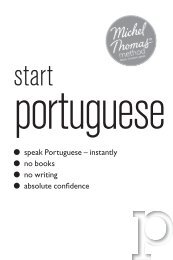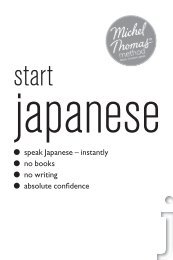MTM Foundation Polish:Polish - Michel Thomas
MTM Foundation Polish:Polish - Michel Thomas
MTM Foundation Polish:Polish - Michel Thomas
Create successful ePaper yourself
Turn your PDF publications into a flip-book with our unique Google optimized e-Paper software.
38<br />
CD8 Track 9<br />
To form the wy, ‘you’ (pl. inf.), form in the present tense, add -cie to<br />
the ‘pan / pani, he / she / it’ form: (on) wraca ‘(he) is returning’;<br />
wracacie ‘you (pl. inf.) are returning’. The wy ‘you’ (pl. inf.) form in the<br />
past tense is formed by adding -ście (as in jesteście, ‘you are’) to the<br />
‘they’ or ‘you’ (pl. formal) past tense forms: one były ‘they (fem.)<br />
were’; byłyście ‘you (fem. pl. inf.) were’; panie musiały ‘you (fem. pl.<br />
formal) had to’; musiałyście ‘you (fem. pl. inf.) had to’; oni musieli<br />
‘they (masc.) had to’; musieliście ‘you (masc. pl. inf.) had to’; oni robili<br />
‘they (masc.) were doing’; robiliście ‘you (masc. pl. inf.) were doing’.<br />
The past tense of móc ‘to may / can’ does not follow the pattern<br />
above. It belongs to a small group of verbs which base their past<br />
tense forms on the present tense rather than the infinitive – in this<br />
case on the ‘I’ form, mogę: remove the -ę ending and add the past<br />
tense endings as usual. So ona mogła ‘she could’; pani mogła ‘you<br />
(fem. sg., formal) could’; mogłam ‘I (fem.) could’; mogłem ‘I (masc.)<br />
could’; one mogły ‘they (fem.) could’; oni mogli ‘they (masc.) could’;<br />
mogłyśmy ‘we (fem.) could’; mogliśmy ‘we (masc.) could’; on mógł<br />
‘he could’; pan mógł ‘you (masc. sg., formal) could’; on mógł to kupić<br />
‘he could buy it’.<br />
CD8 Track 10<br />
naprawdę ‘really, indeed’<br />
gratulacje ‘congratulations’; gratulować ‘to congratulate’; gratuluję ‘I<br />
congratulate’; gratuluję panu / pani ‘I congratulate to you (sg., formal)’<br />
= ‘I congratulate you’<br />
wracamy ‘we return, are returning’; jedziemy ‘we go, are going’ (by<br />
transport); wracamy niedługo, ale teraz jedziemy na wakacje ‘we are<br />
returning before long, but now we are going on holiday’.



